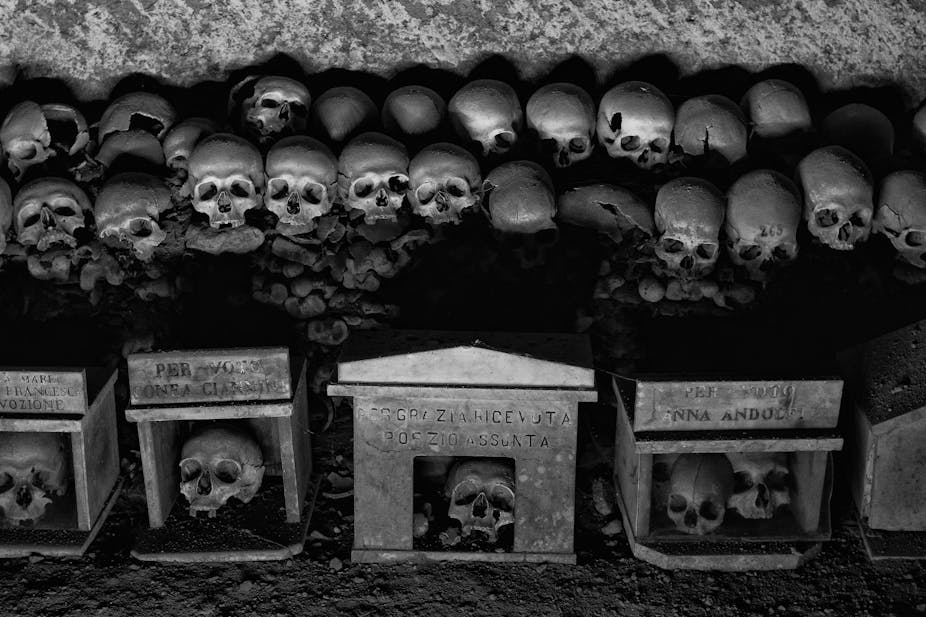Dictators dislike detective novels. Both fascist Italy and Nazi Germany outlawed crime fiction in 1941. The crime novel, according to the Italian Ministry of Popular Culture, weakened the health of the nation. For the Nazis, its threat was the promotion of “pure liberalism,” such as democracy and the rule of law.
If dictatorships don’t like fictional detection, contemporary writers such as Philip Kerr, Rebecca Pawel, Tom Rob Smith and Jung-Myung Lee, are increasingly situating crime stories in totalitarian states. These settings allow for the exploration of troubled, often unresolved pasts. They also provide a space to engage with complex moral issues about individual complicity and the provision of justice in corrupt societies.
For the crime writer this presents a difficult challenge. How to marry the search for truth and the provision of justice that are central features of the crime novel with the role that fictional police protagonists play in upholding an odious state?
This challenge is at the heart of Italian writer Maurizio de Giovanni’s series of novels set in 1931 Naples. The first novel I Will Have Vengeance: The winter of Commissario Ricciardi was published in Italian in 2007. Translated by Anne Milano Appel in 2012, it was a finalist for the Crime Writers’ Association International Dagger award. Since then, a further four novels have been translated into English.
I Will Have Vengeance is set nine years after the March on Rome brought Benito Mussolini’s fascist regime to power. In this time freedoms have been steadily eroded and crime has been declared illegal:
There are no suicides, no homicides, no robberies or assaults, unless it is inevitable or essential. Not a word to the people, especially not to the press: a fascist city is clean and wholesome, there are no eyesores.
Crime, of course, cannot be legislated out of existence. It does exist and it cannot always be covered up, especially when the victim, Arnaldo Vezzi, the greatest tenor of his time and friend of Il Duce himself, is murdered on opening night at the San Carlo opera house.
With this embarrassing stain on the regime’s sense of order, the police are pressured to find the culprit quickly. The man charged with this task is Commissario Luigi Alfredo Ricciardi.
Ricciardi is not your usual fictional police officer. He sees ghosts. Not always. Just the last seconds of those who die violently, from a child killed by a tram while trying to rescue a rag doll to police colleagues fallen in the line of duty. In the case of the dead tenor, his final thoughts are, appropriately, lines from an opera:
I will have vengeance, My rage shall know no bounds, And all my love. Shall end in hate.
Despite the official suppression of crime, the dead keep vigil in the streets and in the bars and homes where they died. “Demanding peace and justice,” they make the Commissario’s journey from home to work a harrowing one. In ensuring justice, Ricciardi provides peace for the victims and, momentarily, for himself.
Although Ricciardi’s visions give him an edge in his investigations, De Giovanni does not violate critic S.S. Van Dine’s rule number 8 for crime fiction that “ouija-boards, mind-reading, spiritualistic se'ances, crystal-gazing, and the like, are taboo”.
Readers will be relieved that the supernatural has no place in the crime’s resolution. Its function in the novel is largely atmospheric, as Ricciardi doesn’t trust the ghosts.
Instead, he puts his investigative faith in the dark side of human emotions: hunger, fear, and love that turns to hate. To solve the crime, he has to get inside Vezzi’s life. By reconstructing his life, he quickly discovers that the “source of national pride” was arrogant, domineering, authoritarian, and a serial seducer of women, particularly married ones.
The negative portrayal of the tenor extends to other characters also closely aligned with the fascist regime, from the director of the opera house to Ricciardi’s immediate superior, an inept boss who only obtained the position thanks to his powerful connections.
Ricciardi, in contrast, displays the independence and disrespect of authority that is typical of the hardboiled hero. He has little time for the regime and its attempts to intimidate the population. He is motivated more by justice than truth, an issue he is forced to grapple with when the murderer is revealed.
The 1930s historical setting is entirely convincing, but one wonders whether the subject is more contemporary and less historical. As critics note, historical novels often say as much about the present as they do the past.
Is this more benign period of Mussolini’s authoritarian rule – with a strong, charismatic leader, a compliant press, and a legal system which doesn’t always toe the line – a thinly-veiled reflection on Italy under il Cavaliere Silvio Berlusconi?
However you interpret the novel, De Giovanni warns his readers to be vigilant, to defend the rule of law and to resist the erasure of freedoms. We know what comes next.
I would like to thank Europa Editions for providing me a copy of the novel.

